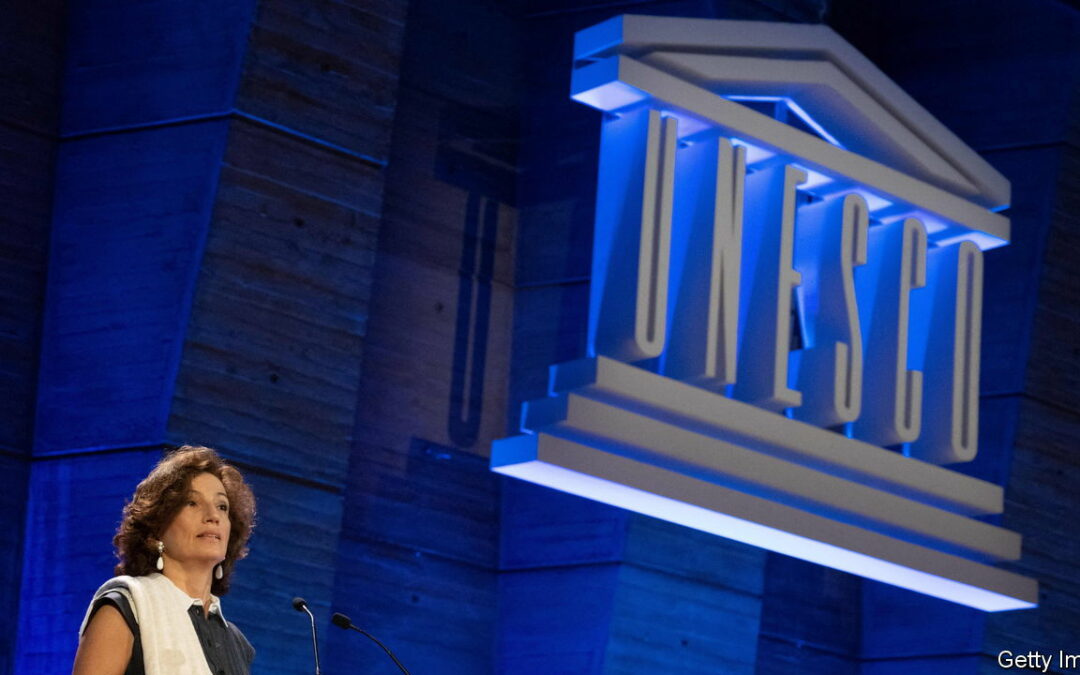AMERICA’S RELATIONSHIP with the United Nations Educational, Scientific and Cultural Organisation (UNESCO) is rocky. The agency seems innocuous: it preserves heritage sites, sponsors literacy projects and promotes education on topics from science to genocide. Yet America has left and rejoined it twice in recent decades. On June 30th UNESCO voted to approve the country’s latest bid to re-enter. Why has America havered about membership—and what prompted its decision to rejoin?
The relationship was not always fraught. During the cold war America saw UNESCO as a partner in the fight for a free flow of ideas and against the Soviet bloc. But from the 1960s a raft of newly independent countries from the global south joined the agency. Many were critical of the West. In the late 1970s UNESCO’s director-general, Amadou-Mahtar M’Bow from Senegal, called for restrictions on press freedom as part of a “new world information order” denouncing industrialised countries’ media dominance. That shift in creed, along with allegations of corruption and profligacy, prompted Ronald Reagan to pull out of the agency in 1984. Nearly two decades later, after the attacks of September 11th 2001, George W. Bush rejoined, hoping that UNESCO membership would help him to build support for his war against radical Islamism.
Under Barack Obama the turbulence continued. A law passed by Congress in 1994 banned American governments from funding any UN agency that admitted a group that was not recognised as a state by international standards. So in 2011, when UNESCO accepted the Palestinian Authority as a member, the Obama administration had to suspend funding. America retained its membership without paying dues—which had accounted for 22% of the organisation’s budget—but lost its vote in 2013. (An increase of voluntary contributions by other countries in 2012 meant that the lost revenue did not force UNESCO to make big cuts to its programmes.) A series of anti-Israel resolutions—including one passed on the country’s independence day that declared it an “occupying power” and ignored non-Islamic claims to holy sites in Jerusalem—vexed many Americans. In 2017 Donald Trump, anxious to stop accruing arrears and eager to punish UNESCO for these anti-Israel tendencies, announced a full withdrawal.
UNESCO has toned down its politics in the intervening years. A day after Mr Trump withdrew from the agency, Audrey Azoulay, a Jewish French-government minister, was appointed its head, in part to counter allegations of bias. Ms Azoulay has worked hard to woo America back. President Joe Biden lobbied Congress for a short-term waiver that would allow America to bypass the 1994 law and start paying more than $600m in dues accrued during the Obama years. Congress passed the waiver in December 2022 but could yet block the appropriation of funds.
The Biden administration hopes that UNESCO will be a forum for America to reassert its soft power. Today China is the biggest threat to that. It is now UNESCO’s largest funder and has sway within the agency, as America’s secretary of state, Antony Blinken, noted in March. America’s decision to rejoin is part of a broader effort to re-engage with international organisations and challenge China’s influence. (America has also returned to the UN Human Rights Council, which Mr Trump left.) This push is particularly important as the UN sets new rules on artificial intelligence: UNESCO, through its role in science and technology, plays a part in setting ethical standards.
Democrats hope that rejoining will signal a renewed commitment to multilateralism (and a rejection of Mr Trump’s hyper-nationalism). Those on the right argue that pumping millions back into UNESCO will give China more dollars to play with. Investing in other organisations, such as the World Food Programme, which delivers food to hungry people, would be a better use of money, says Brett Schaefer of the Heritage Foundation, a conservative think-tank.
Even before the Americans had been formally readmitted, China’s UNESCO delegate had cast doubts on whether it would stay. And its leaving again is a real possibility if Mr Biden loses his re-election bid next year. “[The president] is solidifying UNESCO as a political football to be kicked around in the coming election campaign,” says Michael Rubin, a researcher at the American Enterprise Institute, a centre-right think-tank. It would be cheap and easy for a future Republican president to reverse course. America’s back and forth with UNESCO may not be over. ■









